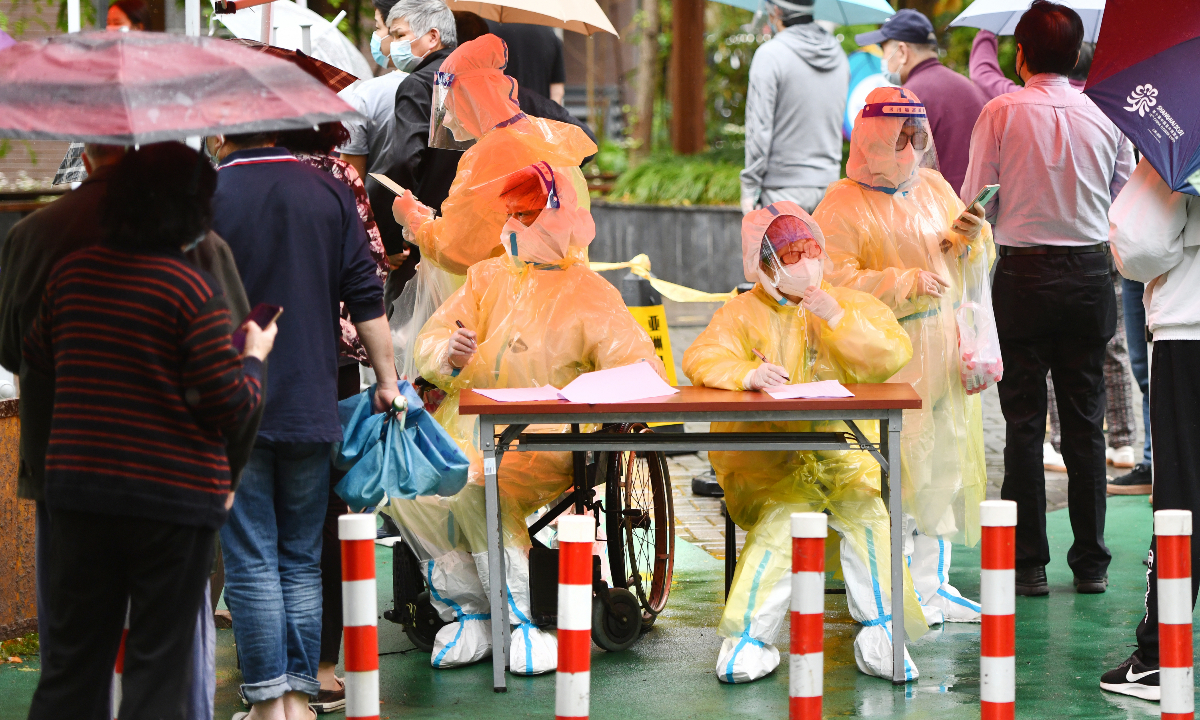
Shanghai residents take nucleic acid testing during the citywide all-member screening on April 23, 2022. Photo: VCG
Shanghai reported 47 more deaths related to COVID-19 infections with the direct causes of underlying diseases on Thursday, making the death tally in the city now 285 in this round of epidemic wave. The 47 patients had an average age of 84.7. There are 304 and 48 COVID-19 cases with severe and critical illnesses in the city.
To help with the medical treatments of these severe cases, doctors from Wuhan of Central China’s Hubei Province arrived in Shanghai in batches. Zhu Wei, vice president of the Guanggu branch of the Tongji Medical College of Huazhong University of Science and Technology is one of them.
Given their experience in fighting the virus in Wuhan and the current situation in Shanghai, we think that the first thing is to set up an early warning system; that is, find patients that may suffer severe illnesses as early as possible and offer timely treatment, Zhu said.
As many patients have different underlying diseases, their medical treatments need cooperation by multiple departments, including those who handle severe illness, cardiovascular system, lungs, kidney, tumor and so on. Moreover, to prevent any deaths, each patient needs specialized treatment, which can handle their diseases and different levels of infection of the coronavirus, said Zhu.
There are 134 medical staff in the third batch that aids Shanghai from Hubei and some have been deployed to the Baoshan branch of Huashan Hospital to take care of the ICU pneumology department. The other medical staff have been arranged to a branch of the No.9 Hospital of Shanghai, said Zhu.
Patients in the ICU departments usually take oxygen uptake treatment and for those who have underlying diseases, they also need to receive special treatment for their own diseases, Zhu told the Global Times.
Most patients with severe illnesses are seniors with more than two kinds of underlying diseases, including issues with their heart and cerebral vessels, chronic lung diseases, malignant tumors or renal insufficiency. While treating the coronavirus, these underlying diseases will also be carefully dealt with, Zhu said, noting that due to the difficulties on communicating, there is more nursing work to do.
Although Shanghai has made initial progress in fighting the latest Omicron outbreak, with a declining daily number of infections found in communities, the city is still facing its biggest challenge in treating severe COVID-19 patients.
As infection cases continue to drop, the surging number of patients in a severe condition poses another severe challenge for Shanghai to cope with the upcoming COVID-19 battle. Experts believe the pressure of treating those patients on Shanghai's medical system will be short-lived, as the metropolis ramps up efforts to expand ICU beds and is propped up by medical experts nationwide.

